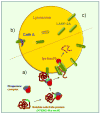Chaperone-mediated autophagy in health and disease
- PMID: 20026330
- PMCID: PMC2843772
- DOI: 10.1016/j.febslet.2009.12.025
Chaperone-mediated autophagy in health and disease
Abstract
Chaperone-mediated autophagy (CMA) is a lysosomal pathway that participates in the degradation of cytosolic proteins. CMA is activated by starvation and in response to stressors that result in protein damage. The selectivity intrinsic to CMA allows for removal of damaged proteins without disturbing nearby functional ones. CMA works in a coordinated manner with other autophagic pathways, which can compensate for each other. Interest in CMA has recently grown because of the connections established between this autophagic pathway and human pathologies. Here we review the unique properties of CMA compared to other autophagic pathways and its relevance in health and disease.
Copyright 2009 Federation of European Biochemical Societies. Published by Elsevier B.V. All rights reserved.
Figures


References
-
- Ciechanover A. Proteolysis: from the lysosome to ubiquitin and the proteasome. Nat Rev Mol Cell Biol. 2005;6:79–87. - PubMed
-
- Goldberg AL. Protein degradation and protection against misfolded or damaged proteins. Nature. 2003;18:895–899. - PubMed
-
- Dice J. Chaperone-mediated autophagy. Autophagy. 2007;3:295–9. - PubMed
Publication types
MeSH terms
Substances
Grants and funding
LinkOut - more resources
Full Text Sources
Other Literature Sources

